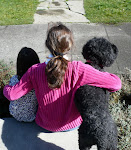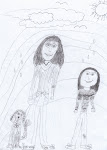I've been thinking a lot and reading a lot lately about the issues Jen Fero raised in the documentary film Adopted which I wrote about recently. As a parent in general but also, as an adoptive parent, I feel a responsibility to learn and do all I can, to pay attention, to stay attuned, and help my Chinese born daughter feel at home in her adopted home, culture, and country. At the same time, I know the risk: it's easy to become hyper-vigilant, to second guess every exchange, and make oneself just a teeny bit ...stir crazy.
I'm thinking back to an exchange I had with my daughter this past summer.
 It was the last weekend in August and my 9 year old daughter and I drove 3 hours south to join the annual reunion of 10 or so adoptive families who traveled together and bonded, 8 long years ago, on our journey to China to adopt our beloved daughters.
It was the last weekend in August and my 9 year old daughter and I drove 3 hours south to join the annual reunion of 10 or so adoptive families who traveled together and bonded, 8 long years ago, on our journey to China to adopt our beloved daughters. This year was the first time, since making this trek, since my daughter understood the significance of this gathering, since she'd struggled with the losses in her story this past spring, that my daughter was excited to go.
The reunion is typically hosted at one very generous family's home. We all contribute different dishes and share in a potluck dinner. We visit. We feast. We celebrate.
As parents, it's our hope our girls will develop and share a life-long bond. As parents, we already share a special bond, remembering that singular morning we gathered together in the lobby of the Liang hotel in Wuhan to meet our toddlers, each and every child looking pale, worried, tearful, and uncertain. We share the bond too of knowing, in a crazy-making-kind-of-way, that any one of our daughters -- the lanky girl running across the garden, the stocky girl sneaking an extra helping of noodles, the girl seated shyly at the table -- could just as easily have been our daughter. None of us will ever know, or be able to divine, the thinking (or even if there was much thinking) that went into the effort to match each girl with each family. It happened thousands of miles away, in a small sterile office, at the China Center for Adoption Affairs, in Beijing. The end result? No music, no fanfare. Just a letter and a crude photo mailed, special delivery, to homes across the US, a single envelope that would change the trajectory of each of our lives.
With the start of the reunion this year, the girls took a little time to warm to each other. But soon enough they embraced each other and the traditional party-like atmosphere. In prior years, one of the dad's had rigged a hose to a giant, jerry-rigged slip'n slide. Another year, the girls had partied on an enormous outdoor trampoline. This year the girls piled like puppies on to a hammock, swinging and tumbling. Then they disappeared to the basement to test their skills at Wii Karaoke and some kind of rock band fantasy. But the big hit, by the end of the evening, was an improvised i-spy, hide and seek game staged in and out of the garden and throughout the house.
It was stunning to see the difference the years have made. The girls seemed especially happy, as if they'd come into their own. They were healthy, strong, boisterous, sassy, and happy, hanging on us parents with an easy sense of entitlement. We might as well have been door posts planted for their pleasure. They rammed, tugged, poked, pulled, and punched at us playfully. We smiled back, caressing a head, stroking an arm, patting a bottom, exercising a parent's prerogative.
It was late in the evening by the time we said our good byes and thanked everyone. My daughter had been running non-stop, laughing, popping in and out of our host's house, clustered together with the gang of girls. Her eyes were bright, her cheeks flushed. She was either coming down with swine flu -- or she'd had a good time. On the drive back to our hotel, I checked in:
"Did you enjoy the reunion?"
"Yeah Mom. It was great. It was awesome!"
"Awesome, huh? Well, that's good news. I'm glad we came."
"Yeah. Me too. And, guess what Mom?" She whispered: "I'm not supposed to tell you this -- so don't say a word to the other parents -- but I just have to tell you --"
(What mom doesn't love this?)
"What's that honey?"
"We were aliens! We decided to pretend all the Chinese girls were aliens. And, we were hiding and spying on the parents!"
"Nooo way. Too funny."
We talked on, sharing impressions of the night. Nostalgia got the better of me and I shared a confession, dead certain the other moms felt exactly the same way -- and would have felt the same way again, even if the match between girls and parents had somehow played out differently.
"You know honey... I love each and every one of you girls. We're all family in a sense. Our lives are connected. But I feel blessed cause somehow I had the amazing good fortune of becoming your mom. I love being your mom."
She was quiet a moment. "But you know.... you're not my mom."
My heart lurched and froze for a nanosecond. Did the reunion trigger something? Were we headed back to the exchanges of last spring?
"No..?" I asked weakly. I glanced in the rear view mirror and saw her raising her palms upward. She looked at me -- like I was slow.
"I just TOLD you! I'm an ALIEN!"
I laughed. Apologized. And resumed breathing.

Sometimes, just sometimes, an alien is just an alien.











 Friends argued a loving mother, a warm, stable home life, and extended family and friends were better than the alternative, institutional life, or nothing at all. I bought into their arguments and, at the same time, told myself there was always the possibility I might still meet someone wonderful. I had the issue neatly and rationally sorted out in my mind -- until I viewed the question from the other side.
Friends argued a loving mother, a warm, stable home life, and extended family and friends were better than the alternative, institutional life, or nothing at all. I bought into their arguments and, at the same time, told myself there was always the possibility I might still meet someone wonderful. I had the issue neatly and rationally sorted out in my mind -- until I viewed the question from the other side.
 And, to one very special uncle, with a clear, dry-eye, I offer a huge, humble, heartfelt:
And, to one very special uncle, with a clear, dry-eye, I offer a huge, humble, heartfelt:













